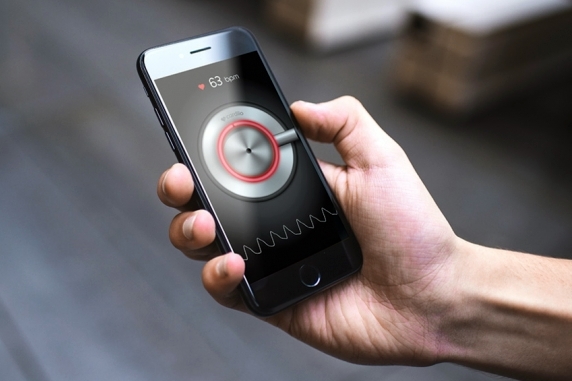30 March 2017. A spin-off enterprise from Massachusetts Institute of Technology is creating a system using a smartphone camera to detect heart rhythm problems that lead to a stroke. The system is designed for a mobile app being developed by Cardiio Inc., a 5 year-old company in Cambridge, Massachusetts.
Measuring heart rhythms is important for people with atrial fibrillation, an irregular heartbeat or arrhythmia that can lead to stroke or heart failure, and affects some 2.7 million Americans, according to American Heart Association. With atrial fibrillation, heart muscle contractions in the upper chambers beat irregularly instead of in a regular rhythm, which can cause blood to pool and lead to blood clots, including those that move to the brain and cause a stroke.
While some people with atrial fibrillation report symptoms, such as a racing heartbeat or light-headedness, many people with the condition experience no symptoms, making it difficult to detect. Some 15 to 20 percent of stroke victims have this kind of irregular heartbeat, and left untreated, people with atrial fibrillation are 4 to 5 times more likely to suffer a stroke.
The new Cardiio system, called Cardiio Rhythm, aims to detect early signs of irregular heartbeat with a smartphone and provide a warning to the phone’s user to get the condition checked out before a stroke occurs. The system uses a process adapted from photoplethysmography, where a camera scans an individual’s face with red and infrared beams, and then captures reflected light from hemoglobin in the blood, making it possible to estimate blood volume.
The Cardiio system, however, refines that process to use ambient light, making it easier for a smartphone camera to capture reflected light from the skin. The app also allows the user to put a finger on the camera to measure blood volume from pulse patterns. Algorithms developed by Cardiio employ machine learning to analyze blood volumes and patterns to detect and distinguish irregular from normal heart rhythms. Cardiio Rhythm is still an investigational device for research and not yet approved for diagnostics.
A paper presented in November 2016 at a meeting of American Heart Association reported on a test of Cardiio Rhythm with 85 hospital patients, and compared those results to conventional electrocardiograms or ECGs. The Cardiio app used 3 facial scans of 20 seconds each to calculate heart rate regularity. The findings show the Cardiio app successfully detected irregular from normal heartbeats in the sample with high sensitivity (93%) and specificity (95%) compared to ECG readings.
Cardiio Inc. is the creation of Ming-Zher Poh, a postdoctoral researcher in MIT’s Media Lab, when he and others founded the enterprise in 2012. The company took shape at Rock Health, a digital health start-up incubator in San Francisco, where Cardiio developed its current lead product, a fitness app for Apple iPhones using a similar technology for monitoring heart rate. Cardiio since relocated to Cambridge, where it partners with Massachusetts General Hospital and two hospitals in Hong Kong.
Poh sees Cardiio Rhythm as meeting a need for medical screening that fills that gap between fitness or wellness apps and full-scale diagnostic systems in clinics. “There needs to be a transition,” says Poh in an MIT statement, “from fitness-oriented devices to more medical applications in order to improve health outcomes. We see ourselves providing the tools to make that transition possible.”
More from Science & Enterprise:
- Sensors, Wearables Track Moods and Eating Behavior
- Mobile App Shown Feasible for Asthma Data
- Mobile App-Controlled Patch Reduces Migraine Pain
- Smart Watch Data Reveal Epilepsy Triggers
- Skin Health Data Collected by App Offered for Research
* * *


 RSS - Posts
RSS - Posts
[…] Univ. Spin-Off Designing Heart Disease Screening App […]
[…] Univ. Spin-Off Designing Heart Disease Screening App […]